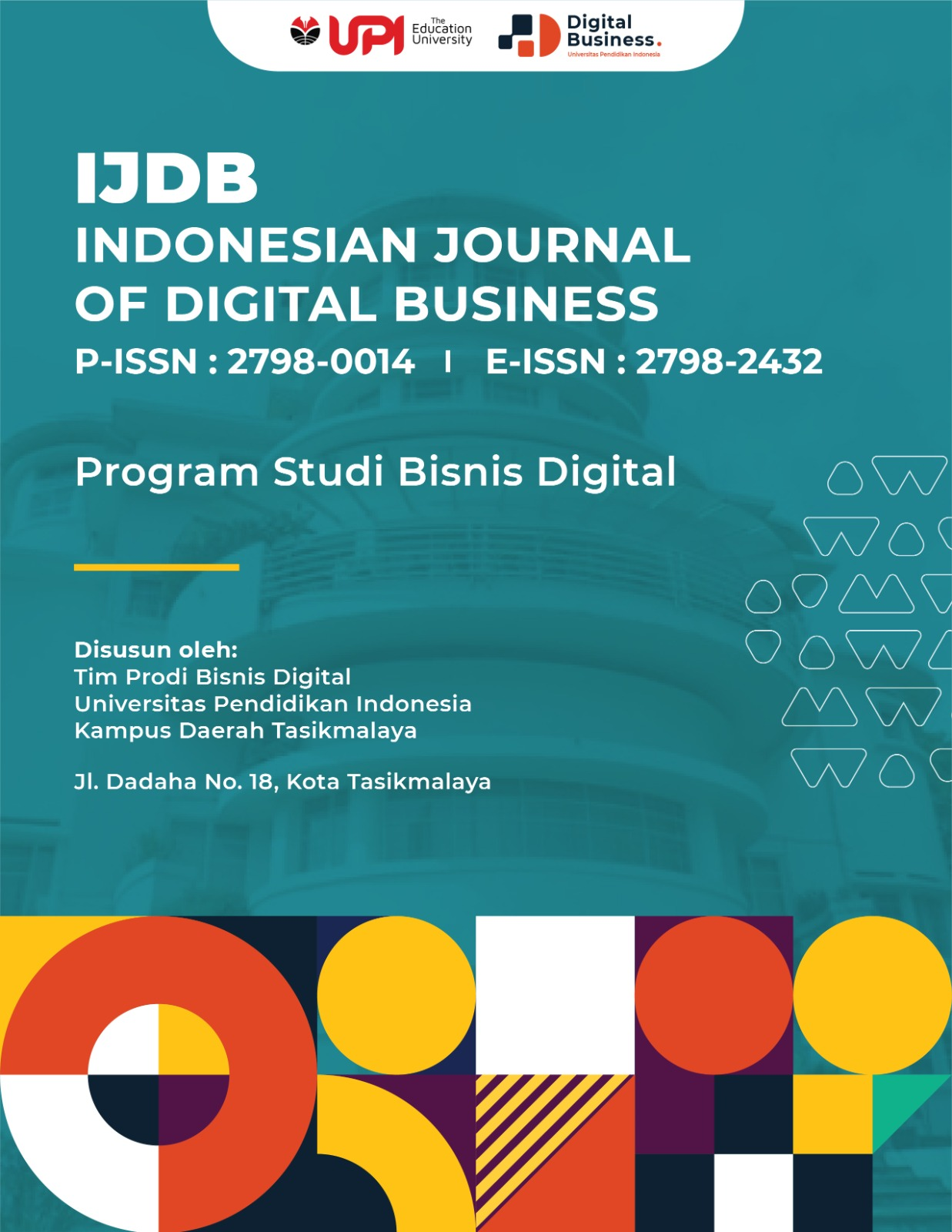Sentiment Analysis For User Review Classification On Jenius Application Using Naive Bayes Algorithm Based On Particle Swarm Optimization
Abstract
The rapid development of information technology and communication has facilitated various aspects of life, including the banking sector. Jenius is one of the digital banking applications that has been downloaded by five million users and continues to grow. With the increasing number of users, there is a growing number of opinions written about their experiences using the application, making it difficult to identify reviews through manual monitoring without textual data processing. This study aims to classify user reviews of the Jenius application on Google Playstore using the Naive Bayes algorithm and Particle Swarm Optimization feature selection. The data used consists of 3047 user reviews of the Jenius application collected from January 16, 2022 to April 13, 2023 and will be divided into two classes, namely positive and negative sentiment. This study also compares the Naive Bayes algorithm using PSO feature selection and without using PSO feature selection. The test results of the two methods indicate that the PSO feature selection with 800 iterations proves to be effective in optimizing the performance of the Naive Bayes algorithm model with an accuracy of 98.50%, precision of 97.81%, recall of 99.36%, and F1-score of 98.58%. Meanwhile, the performance level of the Naive Bayes algorithm without using PSO feature selection is lower with an accuracy of 96.68%, precision of 94.83%, recall of 99.04%, and F1-score of 96.88%.
Keywords
Full Text:
PDFReferences
Afifah, H., Jasmien, L., Qisthi, M., Ihsan, R., & Maesaroh, S. S. (2023). Pengaruh Pemasaran Digital dan Kemudahan Penggunaan Platform Marketplace Shopee terhadap Minat Beli Mahasiswa Bisnis Digital. E-Bisnis: Jurnal Ilmiah Ekonomi dan Bisnis, 16(1), 157-167.
Gika, E. N. N., Hani, R. D., Zahra, D. A. A., Kholishah, A. N., & Maesaroh, S. S. (2023). ANALISIS STRATEGI PEMASARAN DIGITAL DALAM UPAYA PENINGKATAN OMSET PENJUALAN (Studi Pada Konsumen Gojek di Tasikmalaya). Jurnal Pendidikan Tata Niaga (JPTN), 11(1), 18-28.
Gunawan, B., Sasty, H. P., & Esyudha, E. (2018). Sistem Analisis Sentimen pada Ulasan Produk Menggunakan Metode Naive Bayes. JEPIN (Jurnal Edukasi Dan Penelitian Informatika), 4(2), 17–29. www.femaledaily.com
Guntara, R. G. (2022). Aplikasi Pendeteksi Penyakit Telinga Berbasis Android menggunakan API Clarifai dan K-Nearest Neighbor. Jurnal CoSciTech (Computer Science and Information Technology), 3(2), 81-90.
Guntara, R. G. (2022). Aplikasi Pengenalan Citra Wajah di KTP Menggunakan Google Cloud Vision API dan Kairos API Berbasis Android. ILKOMNIKA: Journal of Computer Science and Applied Informatics, 4(2), 198-207.
Guntara, R. G. (2022). Ekstraksi Fitur Warna Citra Daun Untuk Klasifikasi Skala Klorofil dan Rekomendasi Pemupukan. Jurnal Minfo Polgan, 11(1), 15-22.
Guntara, R. G. (2023). Aplikasi Deteksi Phising Berbasis Android Menggunakan Metode Pengembangan Perangkat Lunak DSRM. Jurnal Minfo Polgan, 12(1), 303-310.
Guntara, R. G. (2023). Pemanfaatan Google Colab Untuk Aplikasi Pendeteksian Masker Wajah Menggunakan Algoritma Deep Learning YOLOv7. Jurnal Teknologi Dan Sistem Informasi Bisnis, 5(1), 55-60.
Guntara, R. G., Nuryadin, A., & Hartanto, B. (2021). Pemanfaatan Google Speech to Text Untuk Aplikasi Pembelajaran Kamus Bahasa Sunda Pada Platform Mobile Android. Justek: Jurnal Sains dan Teknologi, 4(1), 10-19.
Hendra, A. (2021). Analisis Sentimen Review Halodoc Menggunakan Naive Bayes Classifier. In JISKa (Vol. 6, Issue 2). MEI.
Herdiana, O. (2023). Perencanaan Business Intelligence untuk Strategi Pengembangan Produk Unggulan Menggunakan Algoritma Support Vector Machine. Jurnal Informatika, 2(2), 28-34.
Herdiana, O., & Aprily, N. M. (2022). Pelatihan Skill Literasi Digital dalam Pengelolaan Data bagi Pelaku Usaha UMKM. Jurnal Abdimas Ekonomi dan Bisnis, 2(2), 86-95.
Herdiana, O., Maulani, S., Firdaus, E. A., & Kunci, K. (2021). Strategi Pemasaran Produk Industri Kreatif Menggunakan Algoritma K-Means Clustering Berbasis Particle Swarm Optimization. Jurnal Nuansa Informatika, 15, 1–13. https://journal.uniku.ac.id/index.php/ilkom
Maruli Sitompul, A., Tunas Bangsa, S., Utara, S., Tunas Bangsa, A., & Jln Sudirman Blok No, I. A. (2021). Teknik Data Mining Dalam Prediksi Jumlah Siswa Baru Dengan Algoritma Naive Bayes. KESATRIA : Jurnal Penerapan Sistem Informasi (Komputer Dan Managemen), 2(2), 108–117.
Moestopo, U., Ayufi, N., Pertiwi, R., & Shabrina, V. G. (2019). Pemanfaatan Co-Creation oleh Jenis Co.Create sebagai Strategi Pengembangan Produk Perbankan Digital Jenius. Petanda : Jurnal Ilmu Komunikasi Dan Humaniora , 01(02), 52–62.
Prajamukti, R., & Mega Santoni, M. (2021, October 28). Klasifikasi Dan Analisis Sentimen Pada Data Twitter Menggunakan Algoritma Naïve Bayes (Studi Kasus: Timnas Indonesia Senior, U-23, Dan U-19). Seminar Nasional Informatika, Sistem Informasi, Dan Keamanan Siber (SEINASI-KESI). https://t.co/SAbaU6Prrz
Prasetyo, Y. (2021). Perencanaan Arsitektur Enterprise Smart School Menggunakan Togaf: Studi Kasus SMK Negeri 13 Bandung. Jurnal Ilmiah Ilmu Terapan Universitas Jambi| JIITUJ|, 5(1), 16-30.
Putri, D. A., Kristiyanti, D. A., Indrayuni, E., Nurhadi, A., & Hadinata, D. R. (2020). Comparison of Naive Bayes Algorithm and Support Vector Machine using PSO Feature Selection for Sentiment Analysis on E-Wallet Review. Journal of Physics: Conference Series, 1641(1). https://doi.org/10.1088/1742-6596/1641/1/012085
Sari, F. V., & Wibowo, A. (2019). Analisis Sentimen Pelanggan Toko Online Jd.Id Menggunakan Metode Naïve Bayes Classifier Berbasis Konversi Ikon Emosi. Jurnal SIMETRIS, 10(2).
Susilawaty, L., & Nicola, N. (2020). Pengaruh layanan perbankan digital pada kepuasan nasabah perbankan. Jurnal Manajemen Maranatha, 19(2), 179–190. https://doi.org/10.28932/jmm.v19i2.2478
Yunhasnawa, Y., & Mardhika, D. (2019). Implementasi Metode Backpropagation pada Prediksi Pemakaian Air Perbulan (Studi Kasus: PDAM Kabupaten Malang Unit Pakisaji).
DOI: https://doi.org/10.17509/ijdb.v4i2.59529
Refbacks
- There are currently no refbacks.
Copyright (c) 2023 Universitas Pendidikan Indonesia (UPI)

This work is licensed under a Creative Commons Attribution-ShareAlike 4.0 International License.
Indonesian Journal of Digital Business is published by Universitas Pendidikan Indonesia (UPI)
and managed by Department of Digital Business
Jl. Dr. Setiabudi No.229, Kota Bandung, Indonesia - 40154
View My Stats



